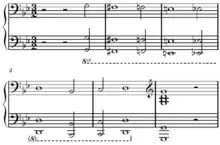Dido's Lament
Dido's Lament is the aria "When I am laid in earth" from the opera Dido and Aeneas by Henry Purcell (libretto by Nahum Tate).

It is included in many classical music textbooks on account of its exemplary use of the passus duriusculus in the ground bass. The conductor Leopold Stokowski wrote a transcription of the piece for symphony orchestra. It is played annually in London by the massed bands of the Guards Division at the Cenotaph remembrance parade in Whitehall on Remembrance Sunday, the Sunday nearest to November 11 (Armistice Day).
Analysis
The opening recitative secco, "Thy hand, Belinda", is accompanied by continuo only. Word painting is applied on the text "darkness" and "death" which is presented with chromaticism, symbolic of death.
Dido's Lament opens with a descending chromatic fourth line, the ground bass,
which is repeated eleven times throughout the aria, thus structuring the piece in the form of a ciaccona. The meter is 3
2 in the key of G minor.
Henry Purcell has applied word painting on the words "laid", which is also given a descending chromatic line portraying death and agony,
and "remember me", which is presented in a syllabic text setting and repeated
with its last presentation leaping in register with a sudden crescendo
displaying her desperate cry with urgency as she prepares for her fate: death. In one interpretation, Dido's relationship with Aeneas is portrayed in this moment as an "apocalyptic romance".[2]
The Aeneid
The text, and the Purcell opera, allude to the Aeneid, the Roman legend of the Trojan warrior Aeneas, travelling to Italy from the betrayed and fallen Troy in order to settle there and secure his son Ascanius's lineage. Their ship is blown off course from Sicily, and they land on the shore of North Africa, in Carthage, a town newly settled by refugees from Tyre. Aeneas falls in love with their queen, Dido, but dutifully departs for Italy leaving her. Distraught at his betrayal, she orders a pyre to be built and set ablaze so that Aeneas will see from his ship that she has killed herself. She sings the lament before stabbing herself as Aeneas sails on.
Text
Recitative
Thy hand, Belinda, darkness shades me,
On thy bosom let me rest,
More I would, but Death invades me;
Death is now a welcome guest.
Aria
When I am laid, am laid in earth, May my wrongs create
No trouble, no trouble in thy breast;
Remember me, remember me, but ah! forget my fate.
Remember me, but ah! forget my fate.
Sources
- Kapilow, Robert (2008). All You Have to Do Is Listen, p. 151. ISBN 978-0-470-38544-9.
- http://www.theretuned.com/apocalyptic-romance-when-i-am-laid-in-earth/ Archived December 20, 2012, at the Wayback Machine
External links
- Free scores by Dido and Aeneas in the Choral Public Domain Library (ChoralWiki), "Dido's Lament" are movements 37 and 38 in this edition
- "Didos Lament": Scores at the International Music Score Library Project
- "When I am laid in earth" on YouTube, Elin Manahan Thomas, with score